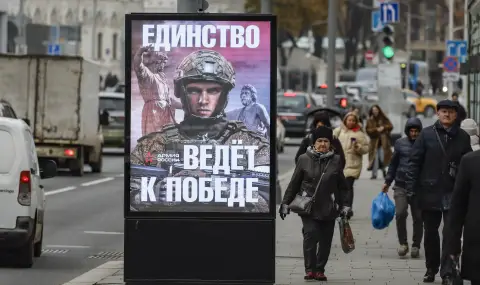"Whether you hide or not, he will find you - he is evil, he is a predator", he wrote under a terrifying photo of a Russian combat helicopter. The text and photo are on a poster that has been hanging for months on the Old Arbat, the most famous pedestrian area in Moscow, reports ARD Moscow correspondent Ina Ruk.
Another poster shows a heavy tank, also shot from the front, which seems to aim at those watching it: "Do you hear that? Noise of imminent revenge?" People walk around the posters, but they don't pay much attention to them - very rarely does anyone stop and look.
1000 days of the so-called special military operation. War is everyday. And if by any chance anyone doubts whether all this is correct, there is a poster on the Arbat of a soldier with a halo of a saint. Another of the posters reads: "If God is with us, then who is against us?" War is holy, the message reads. Or at least she's untouchable. Those who do not understand it should be careful.
Snitching is back
The open criticism of the war, i.e. her "discrediting," as defined by law, can result in imprisonment. Russian opposition activist Ilya Yashin spent more than two years in prison for talking about Bucha on his YouTube channel. In August 2024, he was released as part of a hostage exchange.
Some lesser-known personalities are behind bars just for a social media like. Or because someone claims that they spoke critically about the war - like pediatrician Nadezhda Buyanova, who is 68 years old and has 40 years of experience in Moscow.
According to the mother of her young patient, she spoke negatively about the war while examining him. The mother, who is the widow of a soldier who died in Ukraine, reported this to the police. Buyanova rejects the accusations and although there is a lack of evidence, a judge sentenced the doctor last week to 5.5 years in a penal colony. "This is absurd," says Buyanova in the courtroom, quoted by ARD. In summary: with the new laws, snitching has also returned.
The ubiquitous propaganda
1000 days of war also means 1000 days of military propaganda - there is no escape from it, no matter where you are, writes Ina Ruk. There are endless reports on the TV about the achieved military successes, and in the talk shows they are literally shouting against Ukraine and against the "warmongers" in the EU.
Propaganda is everywhere. In villages and towns hang large pictures of soldiers from the front, on school holidays children dance in uniforms, shop windows are full of posters advertising military service. There are also advertisements on ticket machines for the Moscow metro - they promise 50,000 euros for the first year at the front. And those who are mired in debt, as many Russians are, can quickly succumb.
Soldier graves are becoming more and more
But 1000 days of war are also 1000 days of suffering. There are more and more soldier mounds along the Russian graves. In the city of Syktyvkar, for example, the Komi capital in the Northern Urals, a special new cemetery has been created for local men who return in coffins.
The BBC reported back in September that the number of dead Russian soldiers was over 70,000. However, many believe that the number is much higher. The Russian authorities do not give official information.
No one is making accusations out loud, the high payouts to relatives and posthumous awards are designed to reduce suffering - and nip potential protest in the bud. After almost three years of war, the whole country has fallen into grave silence.
Everyone is filled with fear
There is almost no sympathy for the victims in Ukraine - the so-called "brotherly people". Or at least no one publicly demonstrates it. It is difficult to say whether this is due to fear or indifference, ARD points out.
Next to the monuments of Ukrainian writers or on the street signs with their names after particularly severe attacks, sometimes flowers or small handwritten notes that say "forgive us" appear. Sometimes blue-yellow ribbons are found on tree branches, small inscriptions on street lamp posts. However, there is no great public indignation.
Fear in this 1,000 day war, which continues to not even be called that, is everywhere. Sociologists know to what extent fear can falsify the results of polls - that's why they ask their questions in such a way that the answers are not dangerous for the respondents.
Broad support for Putin's course
The independent Russian sociological institute "Levada" regularly collects data on attitudes towards Vladimir Putin's policies, and no matter how carefully the results are interpreted, it turns out that the majority supports his course.
In this regard, the Institute of Sociology of the Russian Academy of Sciences, which is close to the authorities, leaves no doubt: "The military operation" has consolidated society, says the conclusion of the latest study. 78 percent of Russians support the course taken by the Kremlin. Support is growing, writes Ina Ruk in ARD.
The respondents wanted to "definitely participate". "You can see from the numbers that Russia is finally on its feet," says the head of the institute, Mikhail Gorshkov. The content of one of the Arbat posters is similar: "The Russian bear is just waking up. This is just the beginning.
1000 days of war also fundamentally changed Russia. The fight is no longer only in Ukraine, but also against "the enemy in one's own country" for a long time. Those who criticize Putin's policies, are against the war and sympathize with Ukraine are silent. Or they have been away for a long time: the Russian opposition - the loud and the quieter - have left the country, are in internal emigration or are in the penal camps.
Author: Ina Rook ARD
